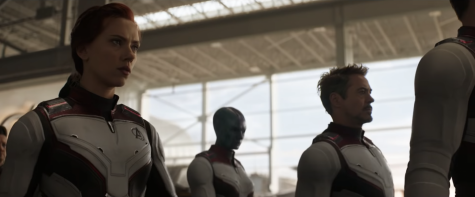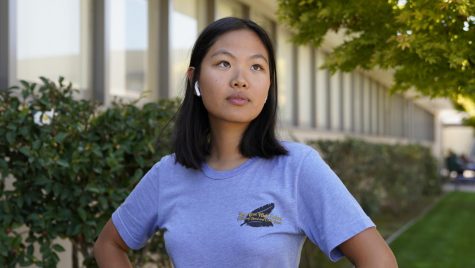“Avengers: Endgame:” just the beginning of the MCU
June 4, 2019
“Avengers: Endgame” marks the explosive climax of the third phase of the Marvel Cinematic Universe (MCU). As the culmination of a cultural phenomenon, it doesn’t disappoint in its emotional poignance and its grand scale—from special effects to fight sequences to special guests. But, as a film, it lacks a strong central story and pays female characters and people of color dust, no pun intended.

“Endgame” picks up after the events of “The Snap” in “Infinity War,” which resulted in the deaths of half of the Earth’s population. Thanos has destroyed the Infinity Stones and the remaining Avengers are reeling from the impact, struggling between choosing to rebuild the world they’ve been left with or making a last-ditch attempt to get back the people they’ve lost.
Overall, this film is a testament to all that Marvel has accomplished in the past ten years, most importantly the all-star cast they’ve assembled. Each and every actor plays their part beautifully, imbuing genuine human emotion into scenes that could easily fall flat from the frankly cheesy and often melodramatic dialogue. It’s thanks to them that this film’s three-hour runtime passes in the blink of an eye. These actors make viewers invest in them and their cause, and in a film with such a large cast and an outrageous premise, that’s a hard thing to do.
In addition, as with most Marvel movies, its huge budget lends itself to some truly incredible scenes, most notably, its main fight sequence. This battle, featuring Thanos’s army against the Avengers is, to me, one of Marvel’s best. First off, they’re able to balance the screen time of dozens of characters and film them in such a way that the narrative of the fight is still clear and easy to understand, something “Age of Ultron” failed at. Moreover, the special effects, which most of Marvel’s heroes rely on, are seamless and impeccably done. Even the shape and color of the magic lending itself to characterization—be it the orange geometric patterns of Doctor Strange (Benedict Cumberbatch) or the elegant sloping red of Scarlet Witch (Elizabeth Olsen).
But much like “Infinity War,” “Endgame” is great in ways that don’t lend themselves to making a good film. To start, the pacing for about the first half hour of the film is unbelievably slow and disjointed. Scenes flip flop between Captain America (Chris Evans) woefully speaking to Black Widow (Scarlett Johansson) to some off-kilter song from the 70s that features unnecessary slapstick humor from Thor (Chris Hemsworth) wandering around New Asgard. All this serves to do is make the film feel messy. Moreover, it takes nearly an hour for the main story to begin.
What stands out the most, though, is the film’s complete disregard for representation as a whole. In terms of women, after “The Snap”, Nebula (Karen Gillan) and Black Widow are the only two women that are present and active. Nebula, more often than not, isn’t included in big conversations or major plot points, so all female representation rests on the shoulders of Black Widow, who has not been an actual character for the past ten years. Since her introduction in “Iron Man,” her character has been changed to fit the narrative of whatever man was leading the film she was in. She was tossed back and forth as a love interest for Hawkeye (Jeremy Renner), then Bruce Banner (Mark Ruffalo), then Cap and back to Hawkeye. Nothing has changed in this film, as almost everything she does involves chasing after a male character and saving him from himself or sacrificing herself for them.
Additionally, people of color just simply do not exist in a major way for the entirety of the film. War Machine (Don Cheadle) and Okoye (Danai Gurira) are there to interject a few lines of dialogue and not much else. In regards to Asian representation, Marvel continues to relegate actual Asian characters to minor roles and instead use aspects of Asian culture as an interesting backdrop—Tilda Swinton playing the Ancient One, a role meant for an Asian person, for example, or Hawkeye going to Tokyo to violently murder a Japanese man on screen. As for Hispanic people, they simply do not exist.
Lastly, LGBT+ representation is abysmal despite what the many articles that praise the first openly LGBT+ character in the MCU try to tell you. In reality, this character appears in one scene and isn’t even given a name. The fact that one of the directors of the film, Joseph Russo, played him is the only notable thing about the character.
It’s clear that Marvel’s still got a lot of growing to do despite its unprecedented success, but “Endgame” did succeed in reigniting my love for superhero films. Marvel’s success was secured by its dedication to telling human stories in spite of the outlandish situations and epic fight scenes. Without fail, Marvel films always ground themselves in human stories and authentic emotions. And that’s what superhero films do best: tell ordinary stories in extraordinary circumstances.“Endgame,” ultimately a story about loss and family and triumph, does just that.



